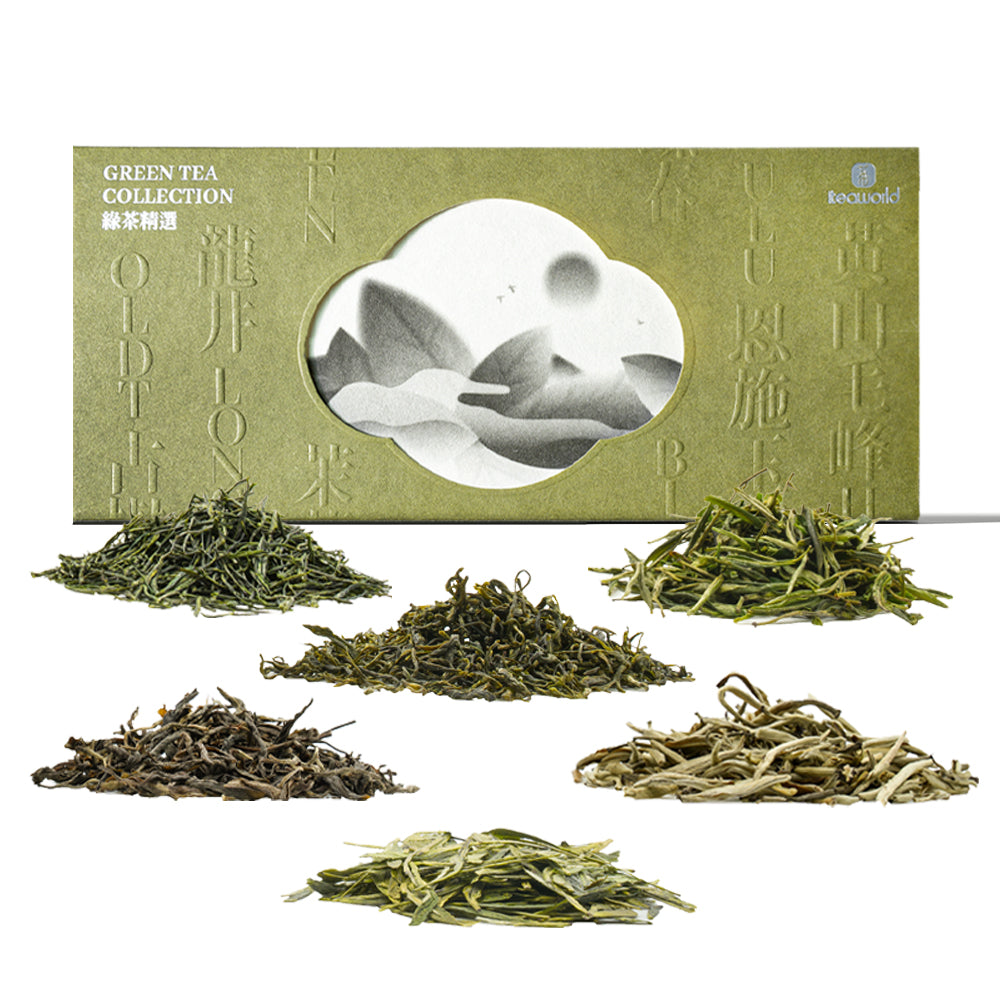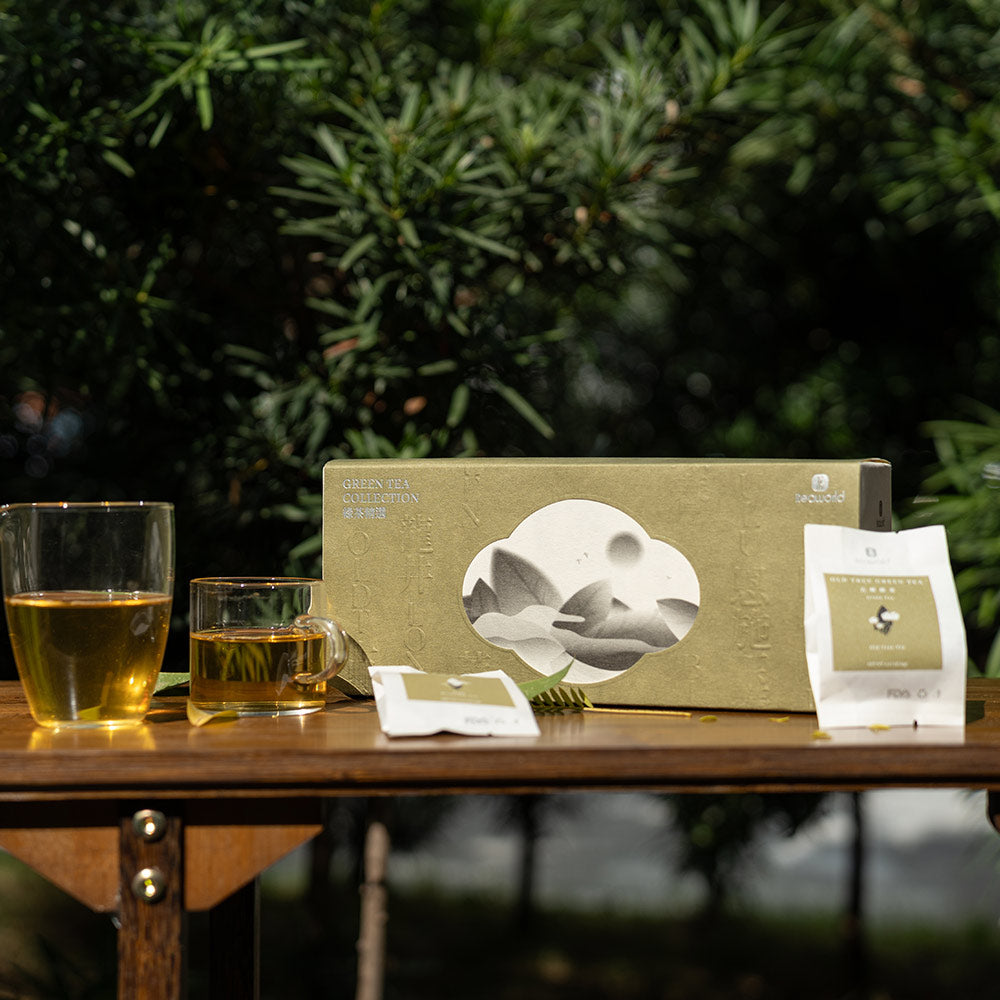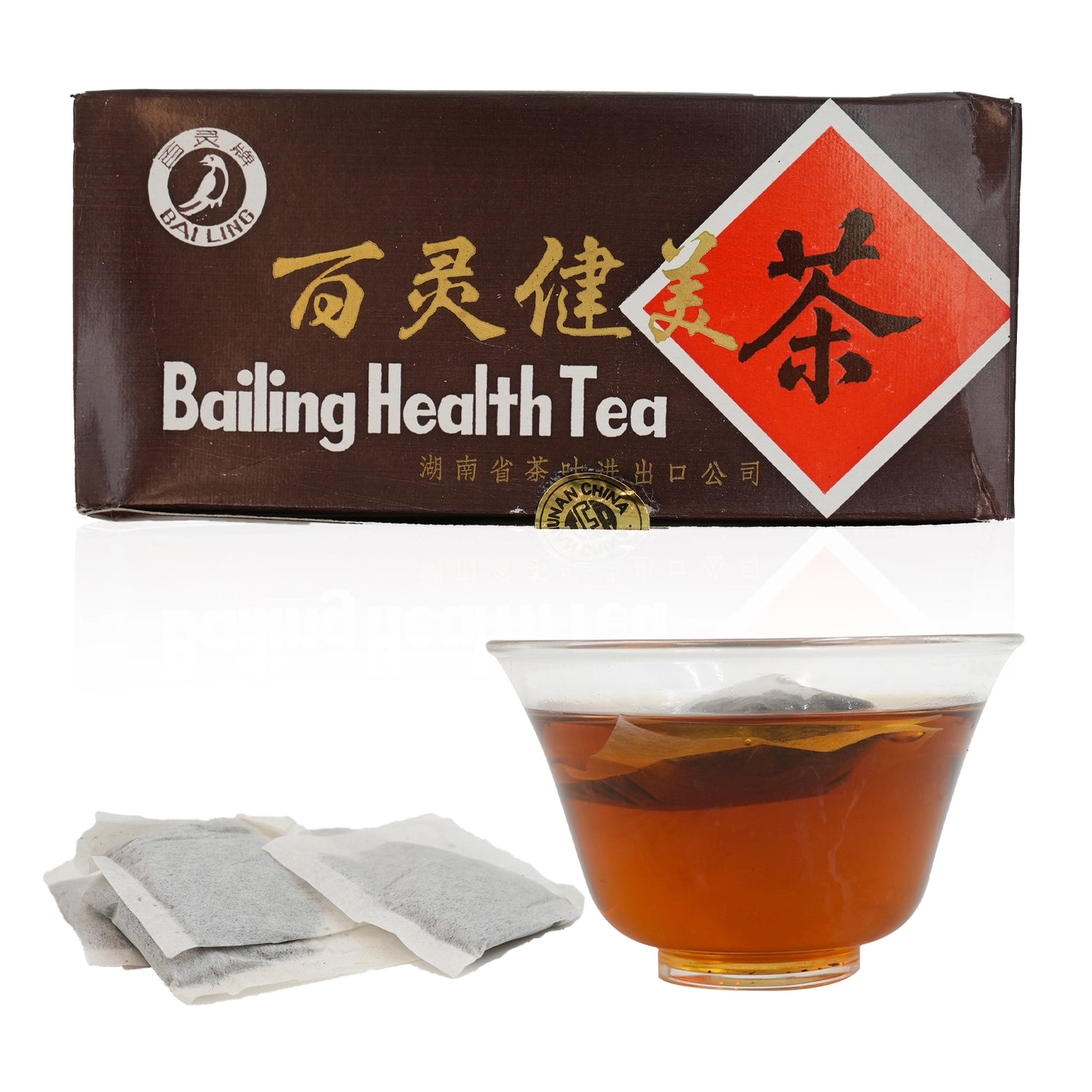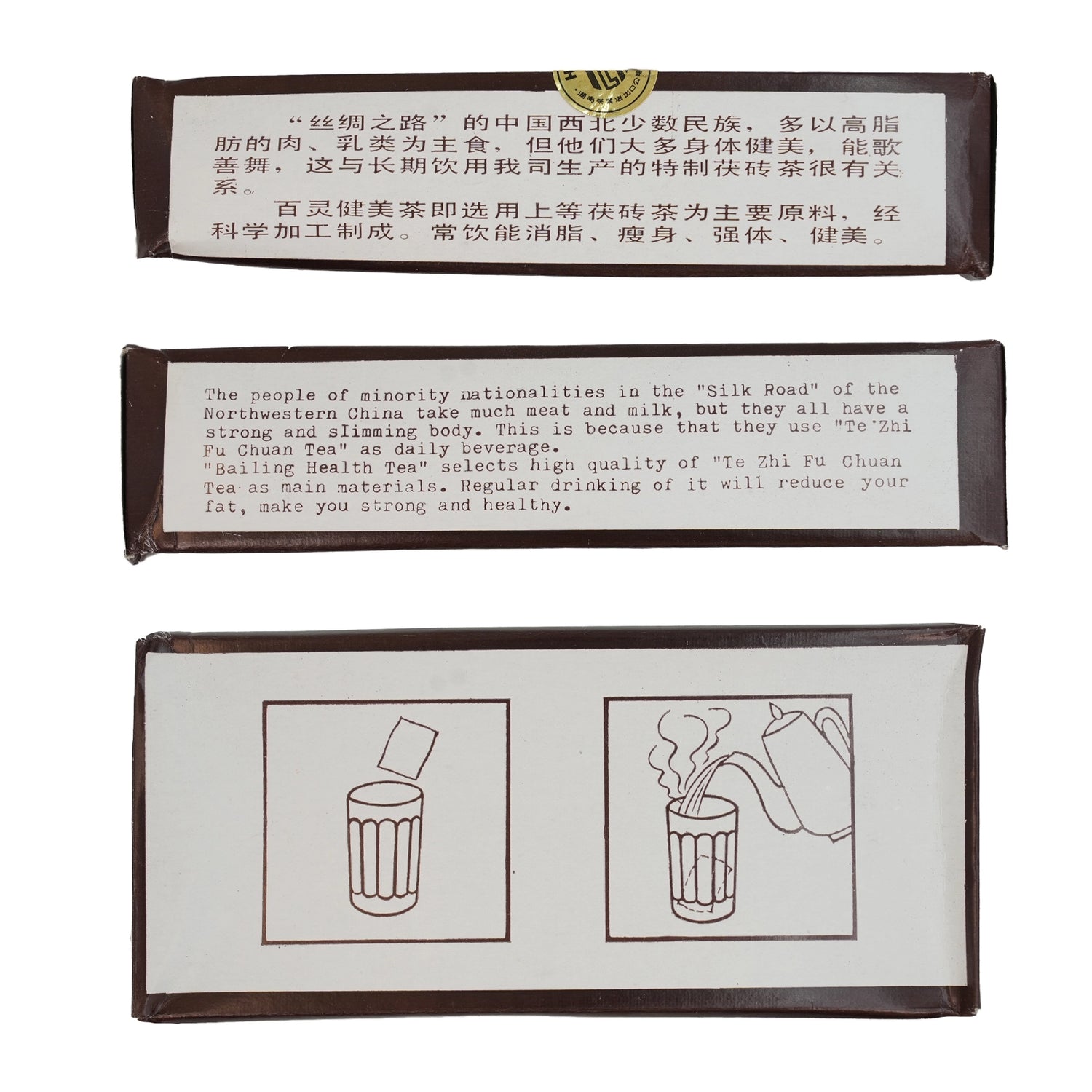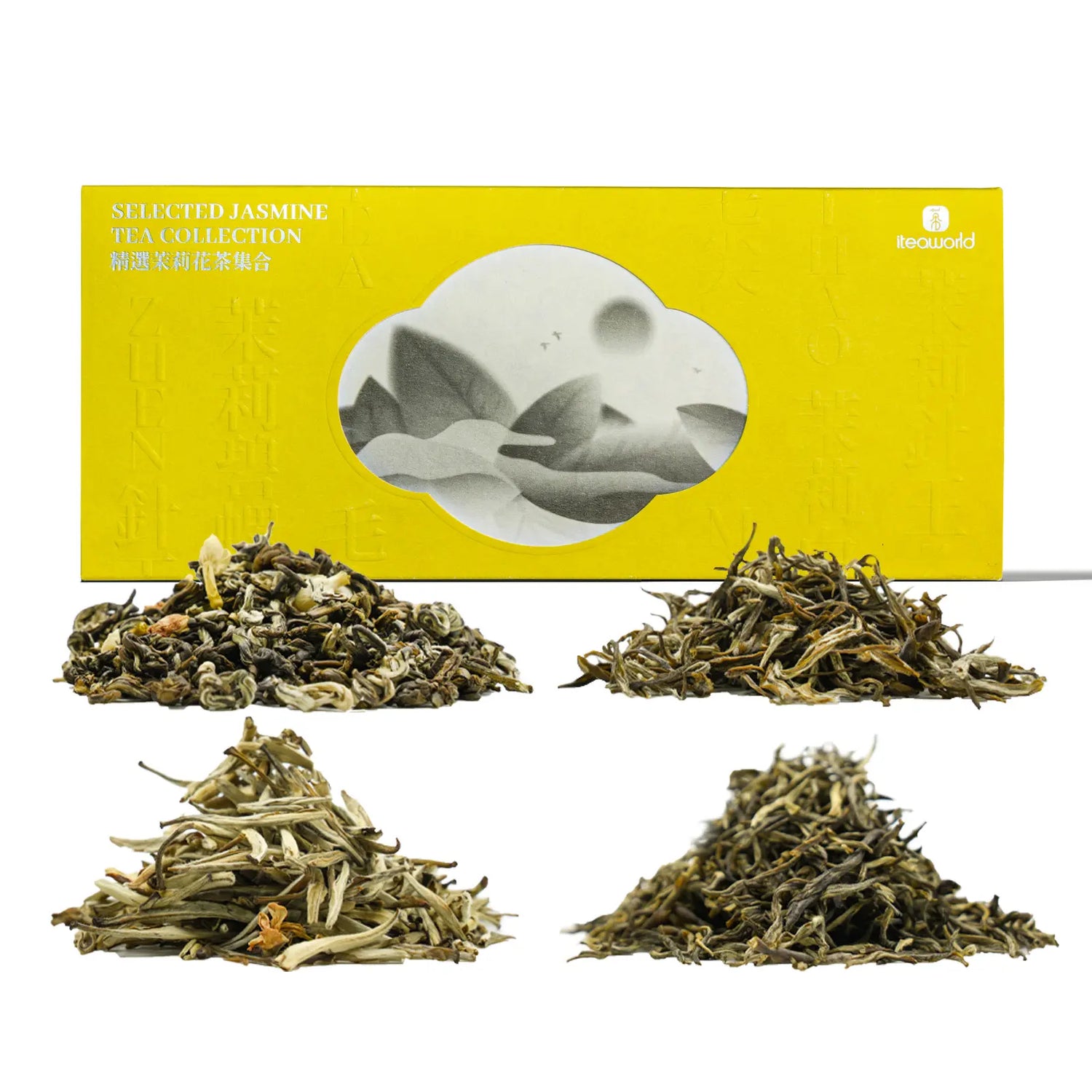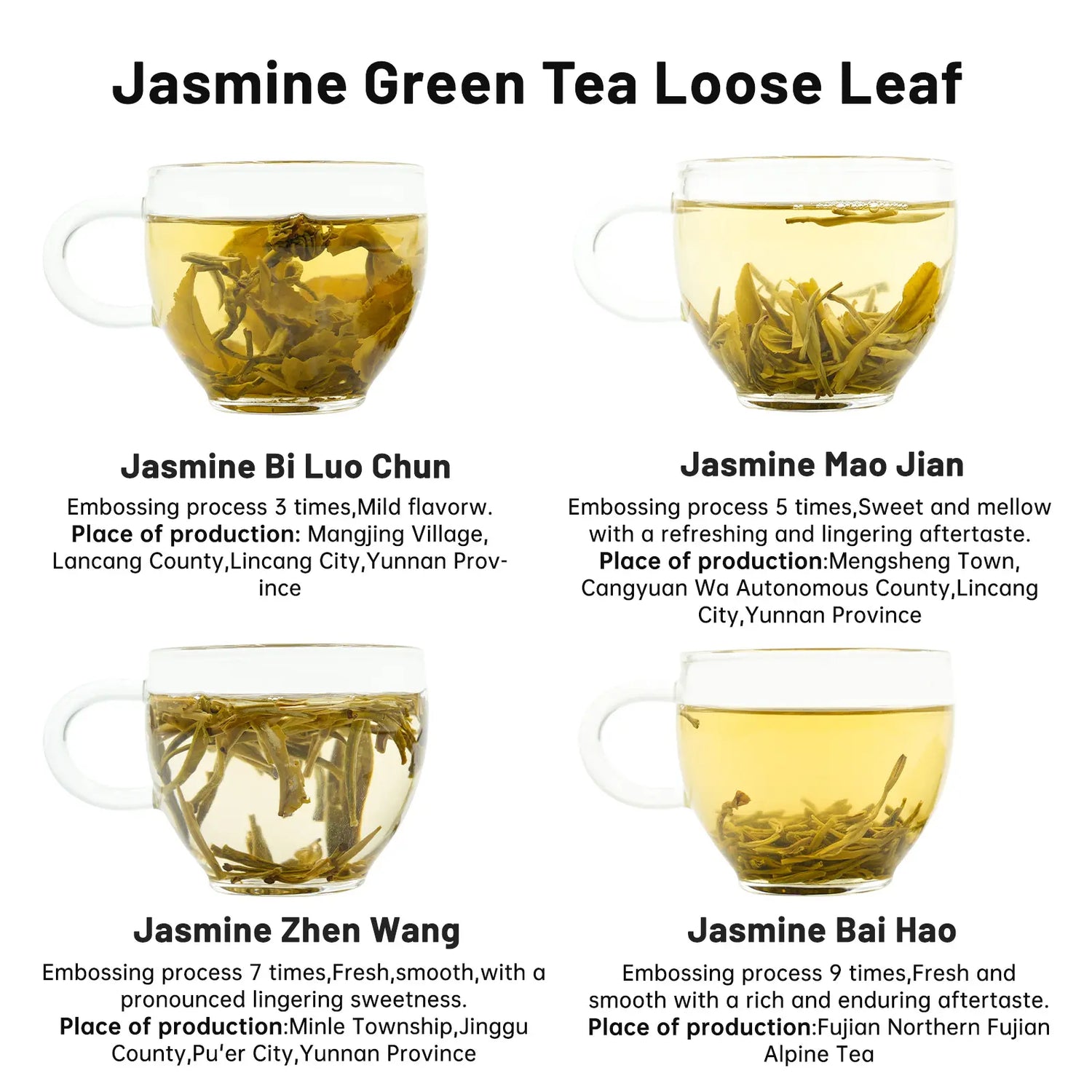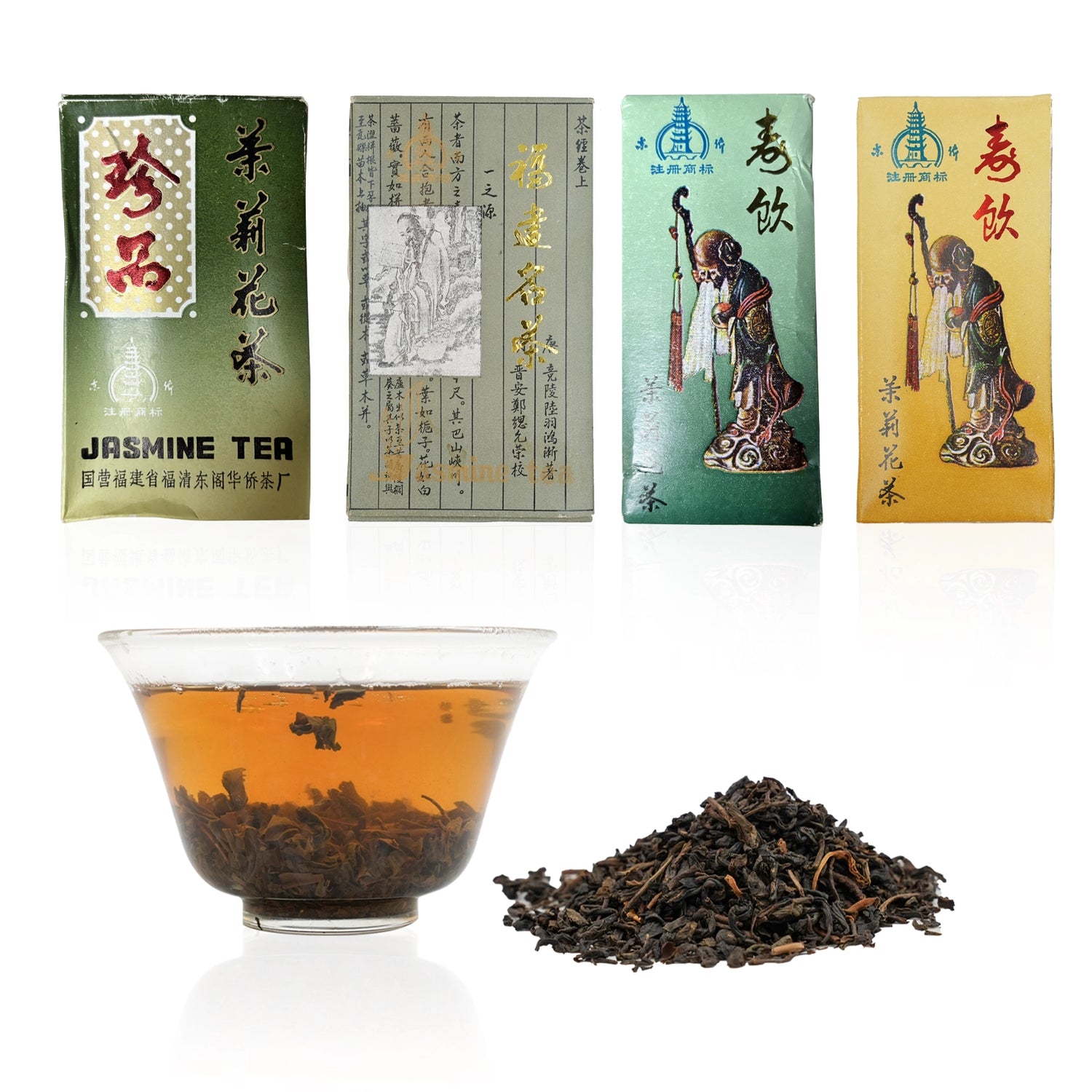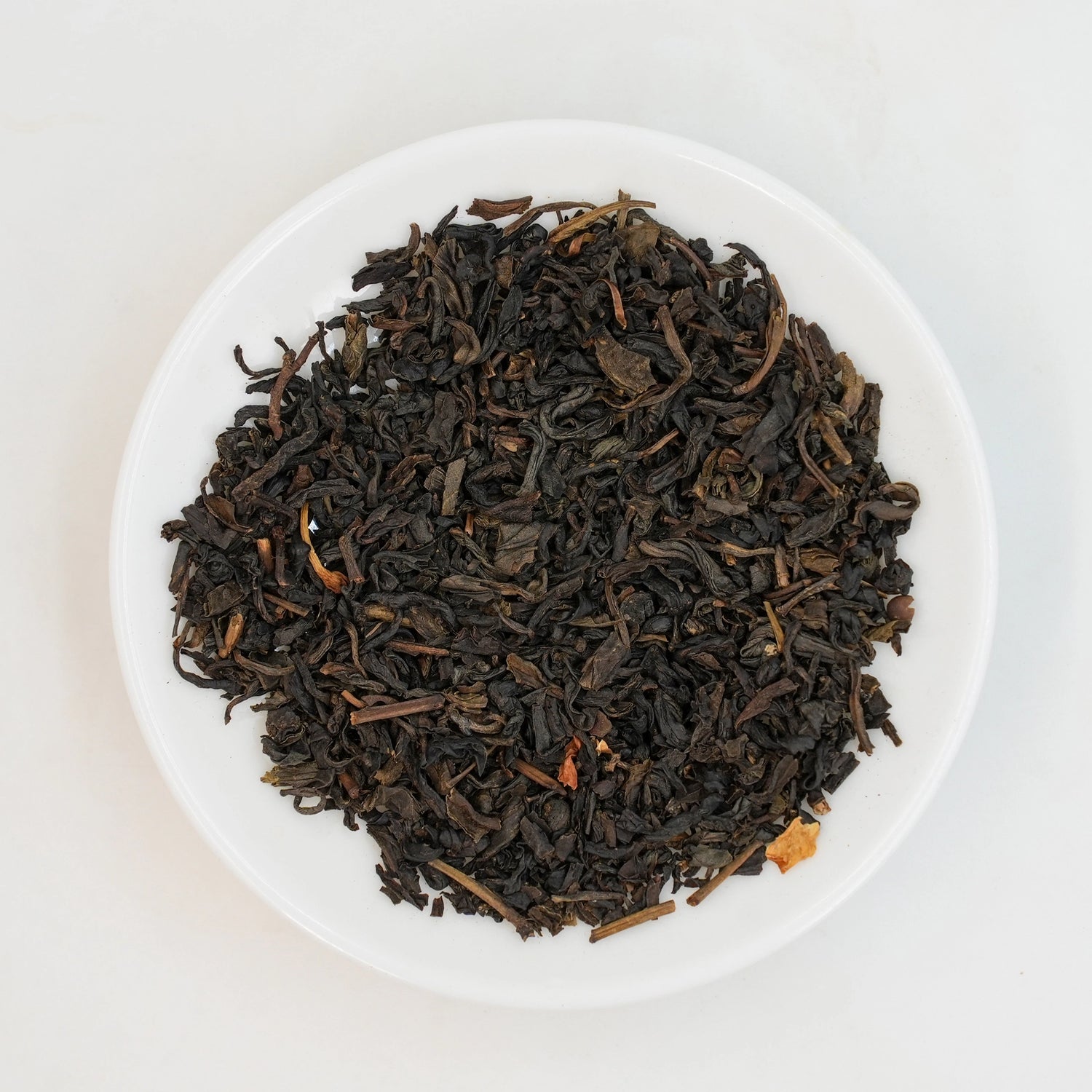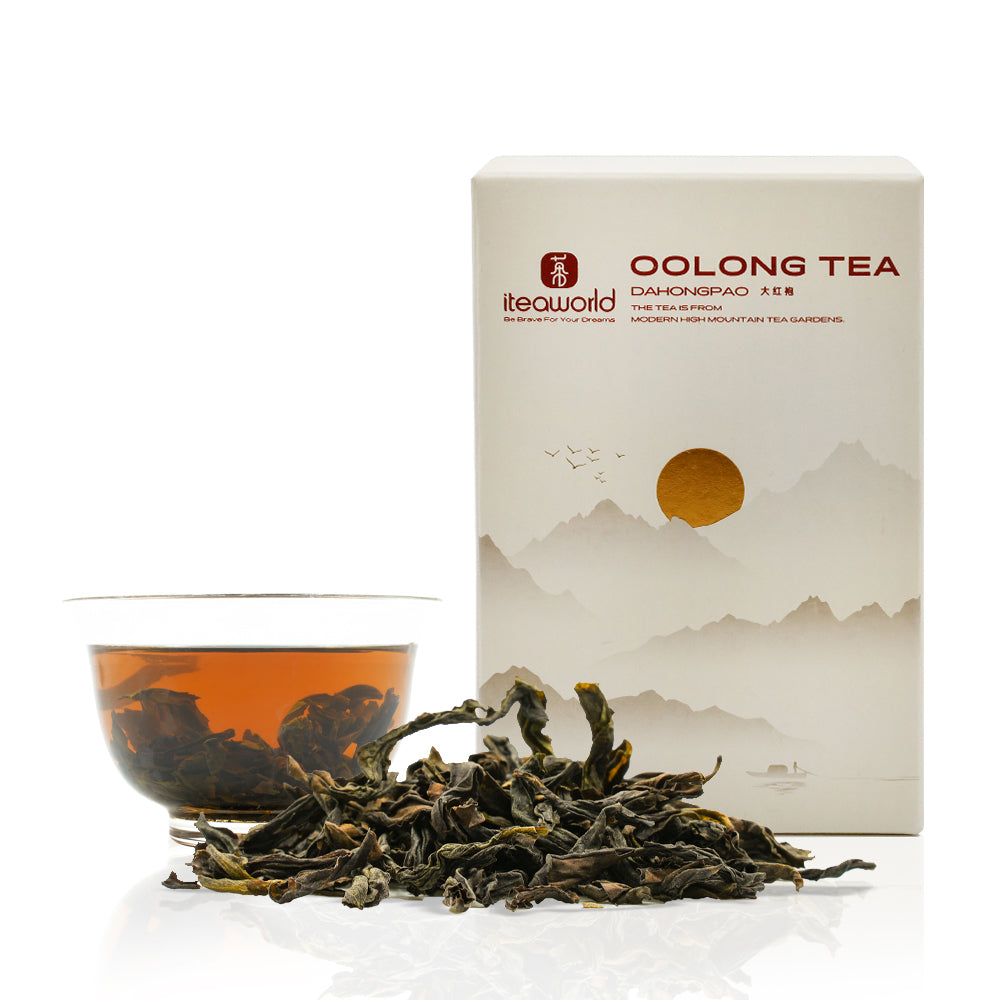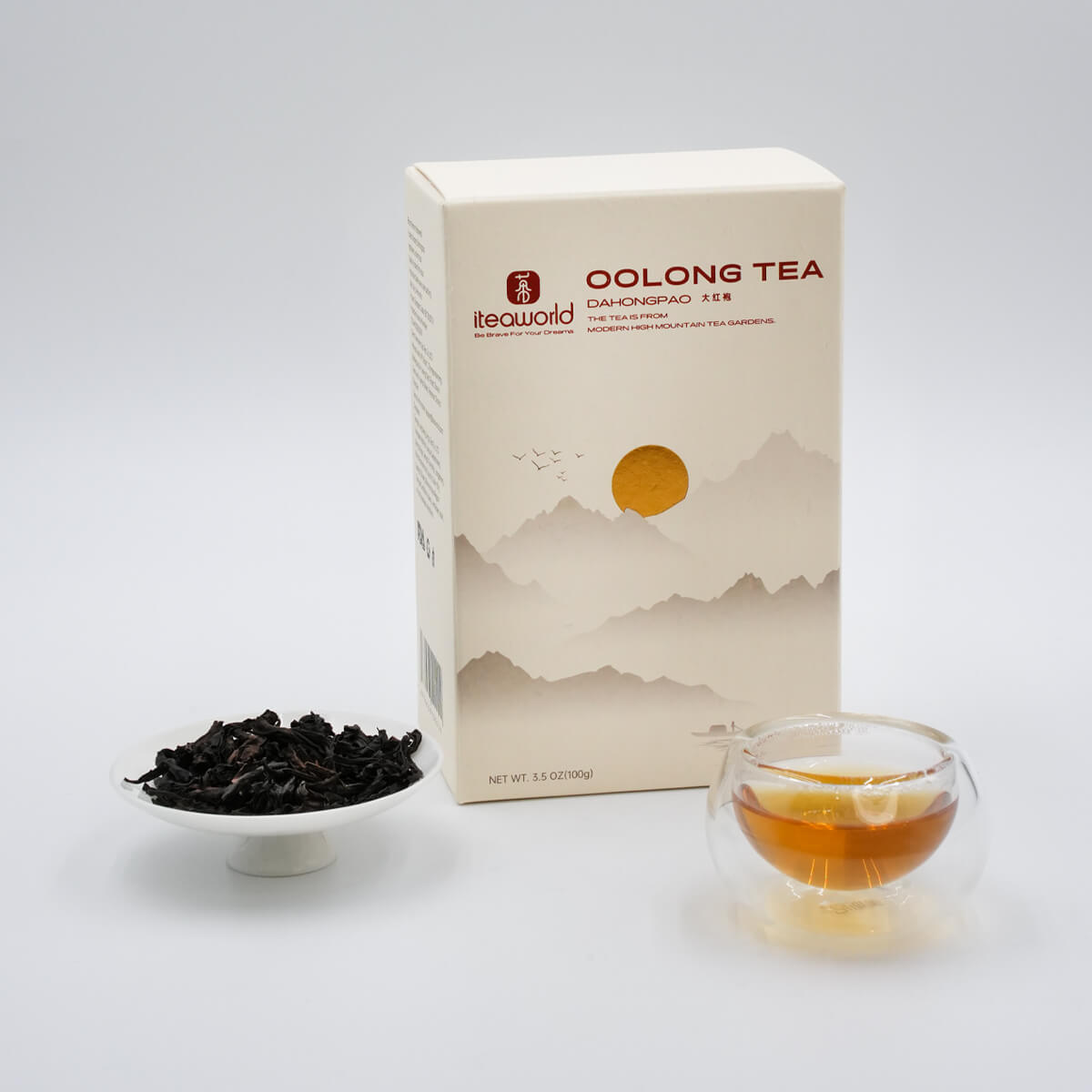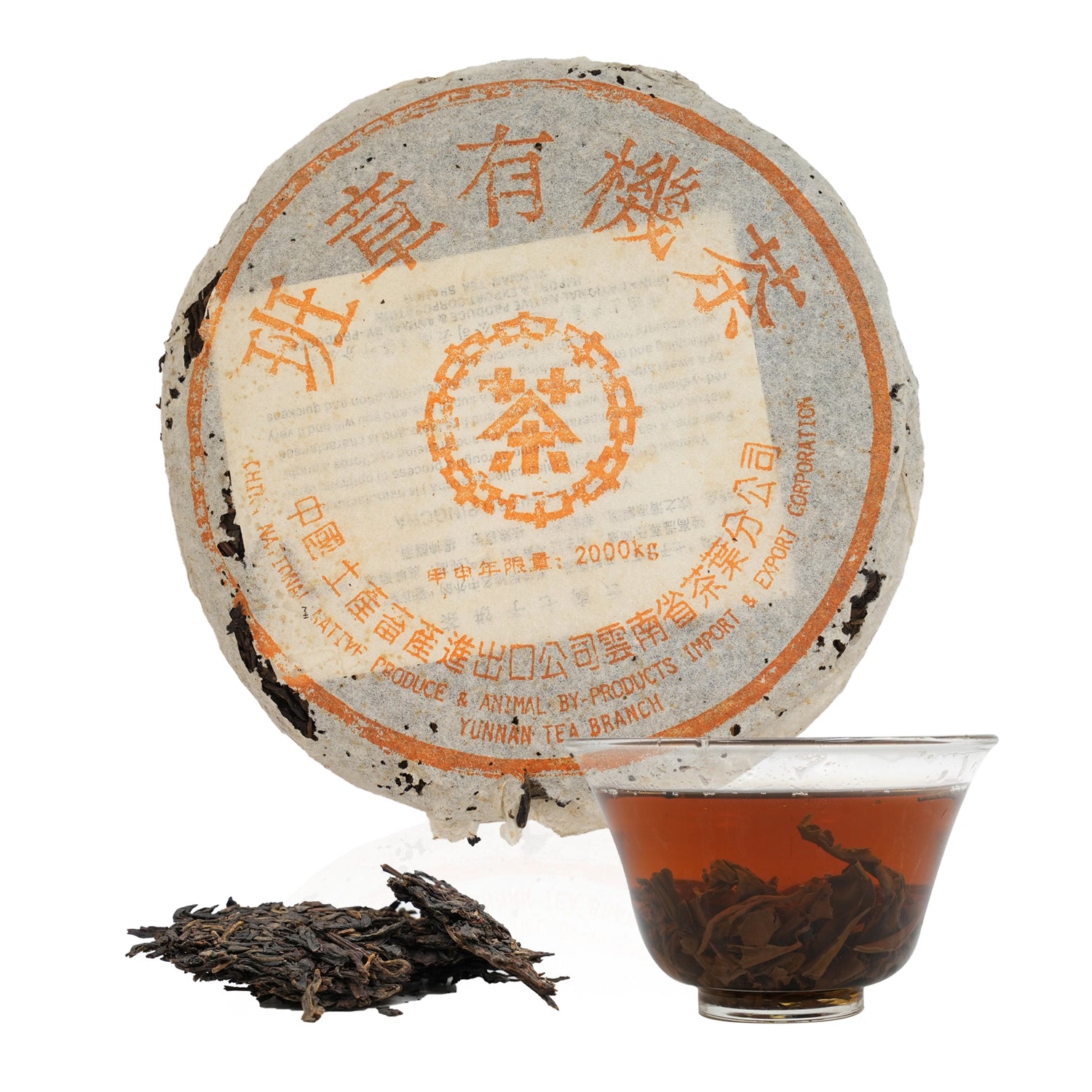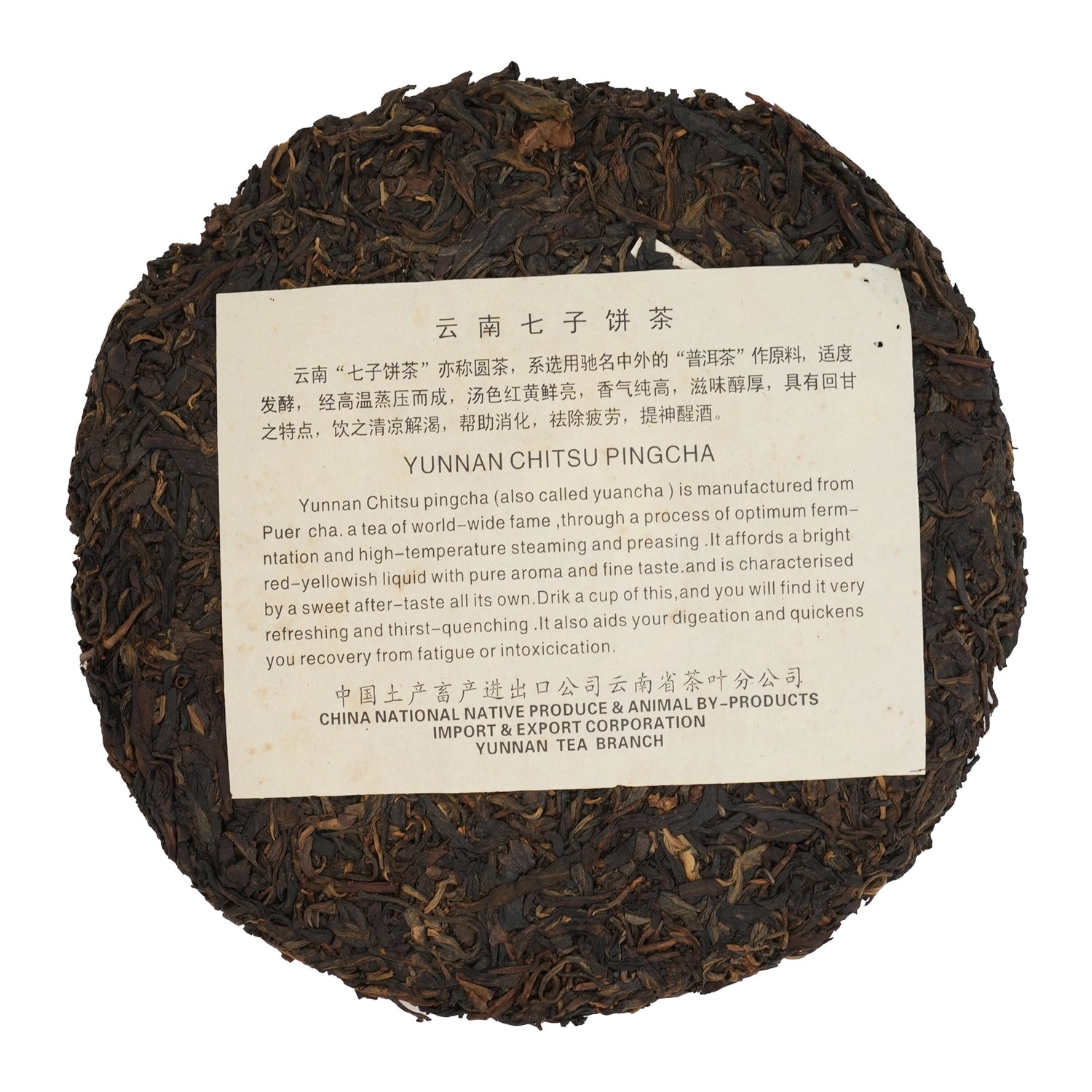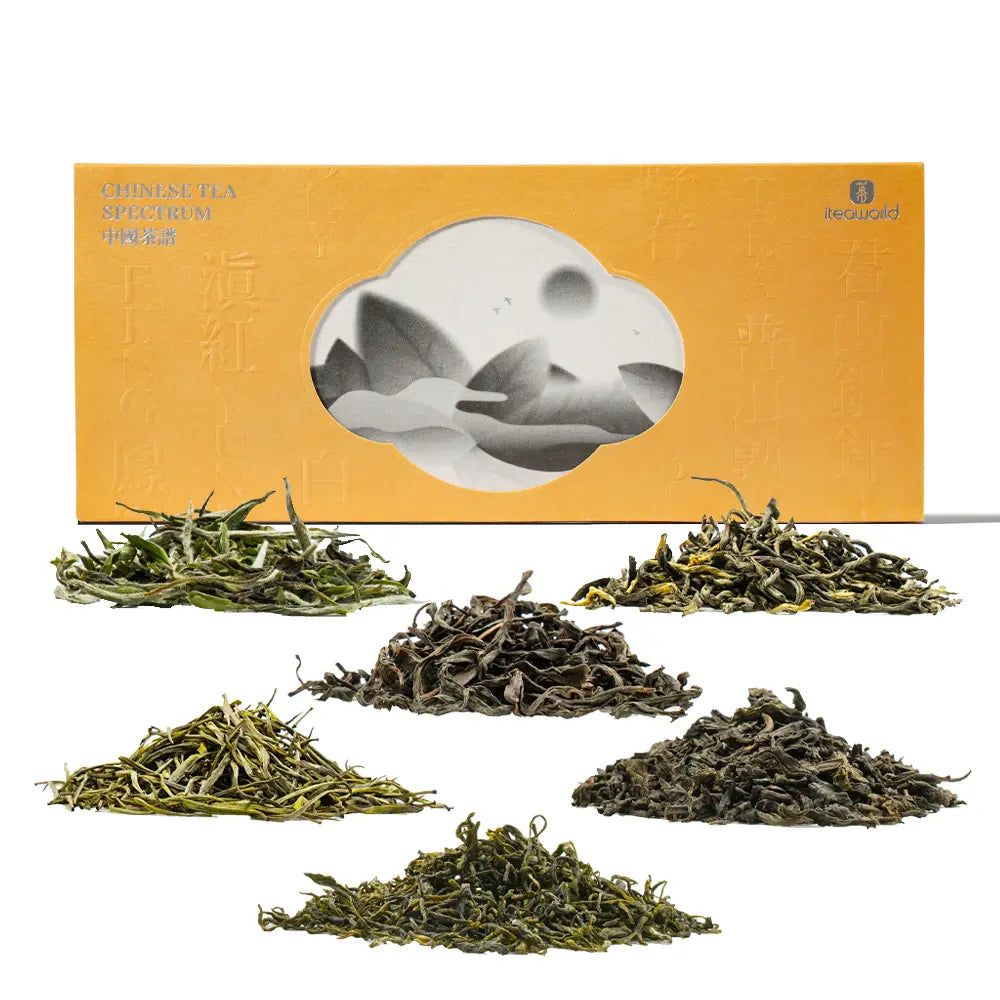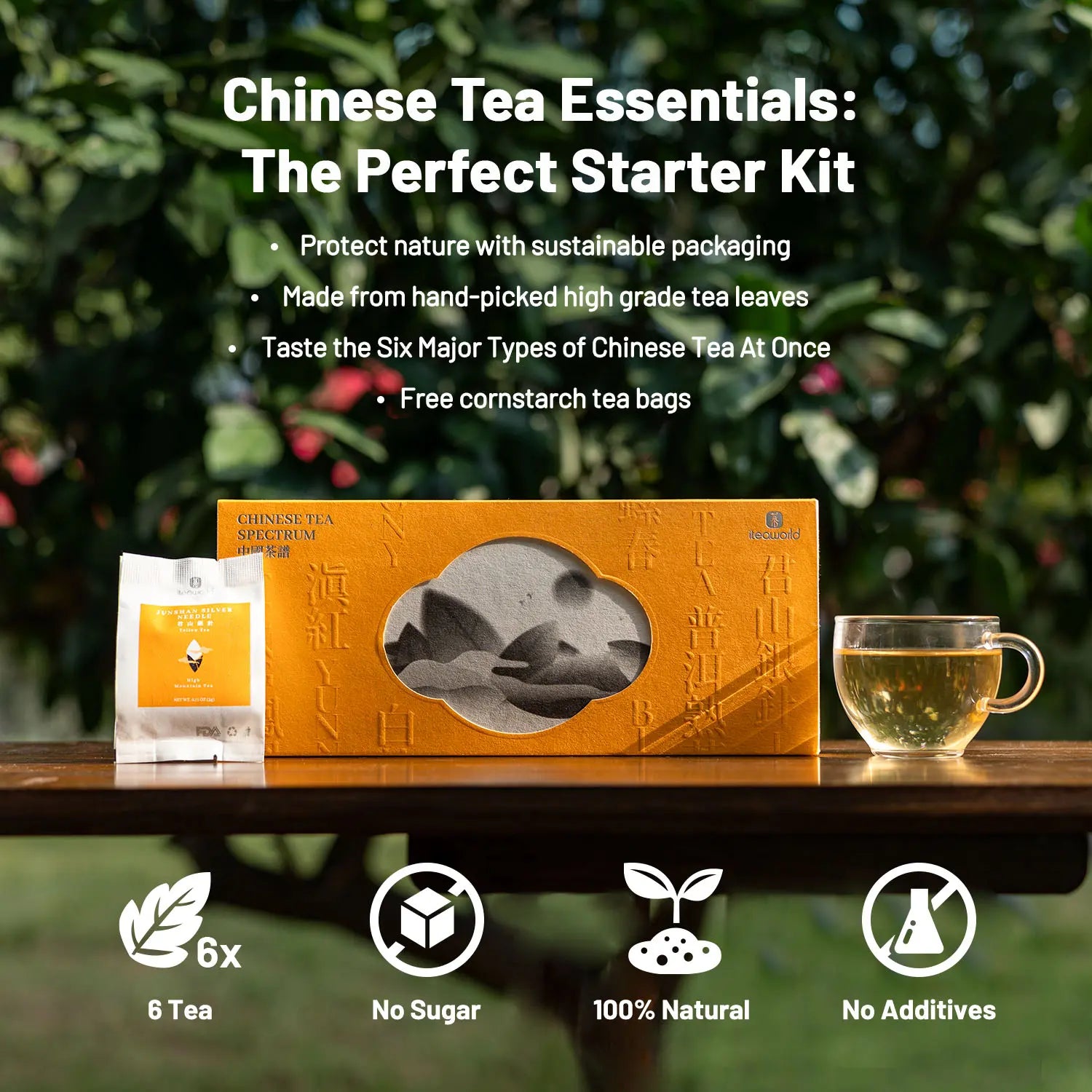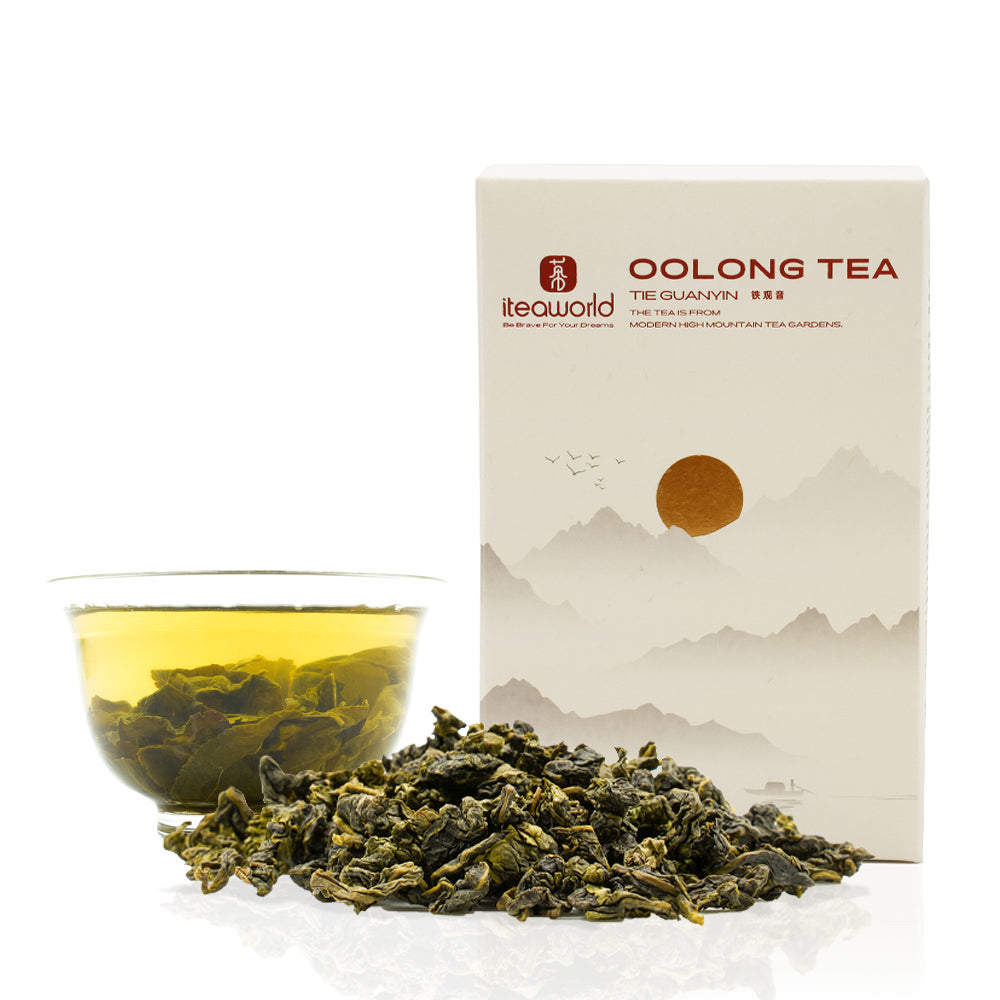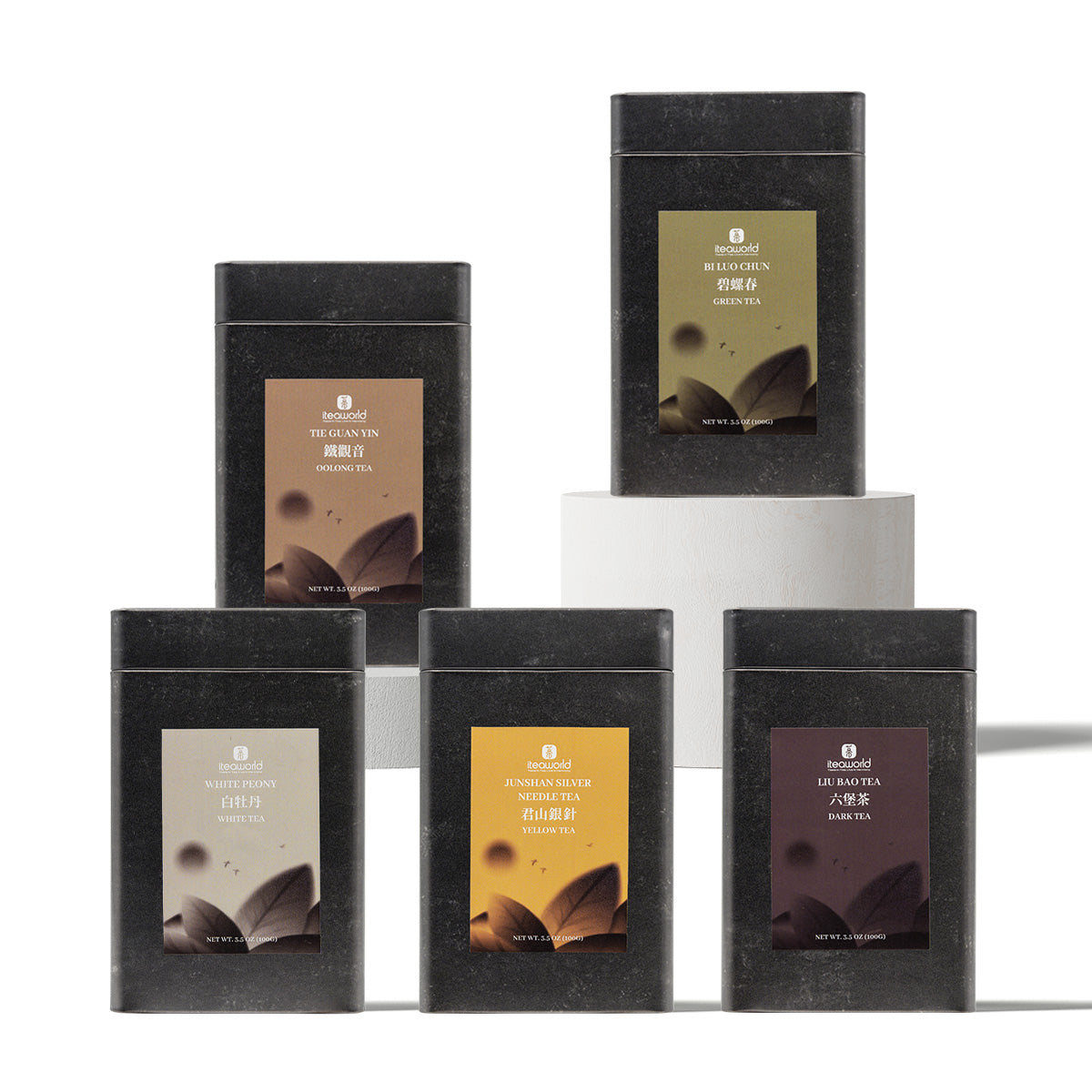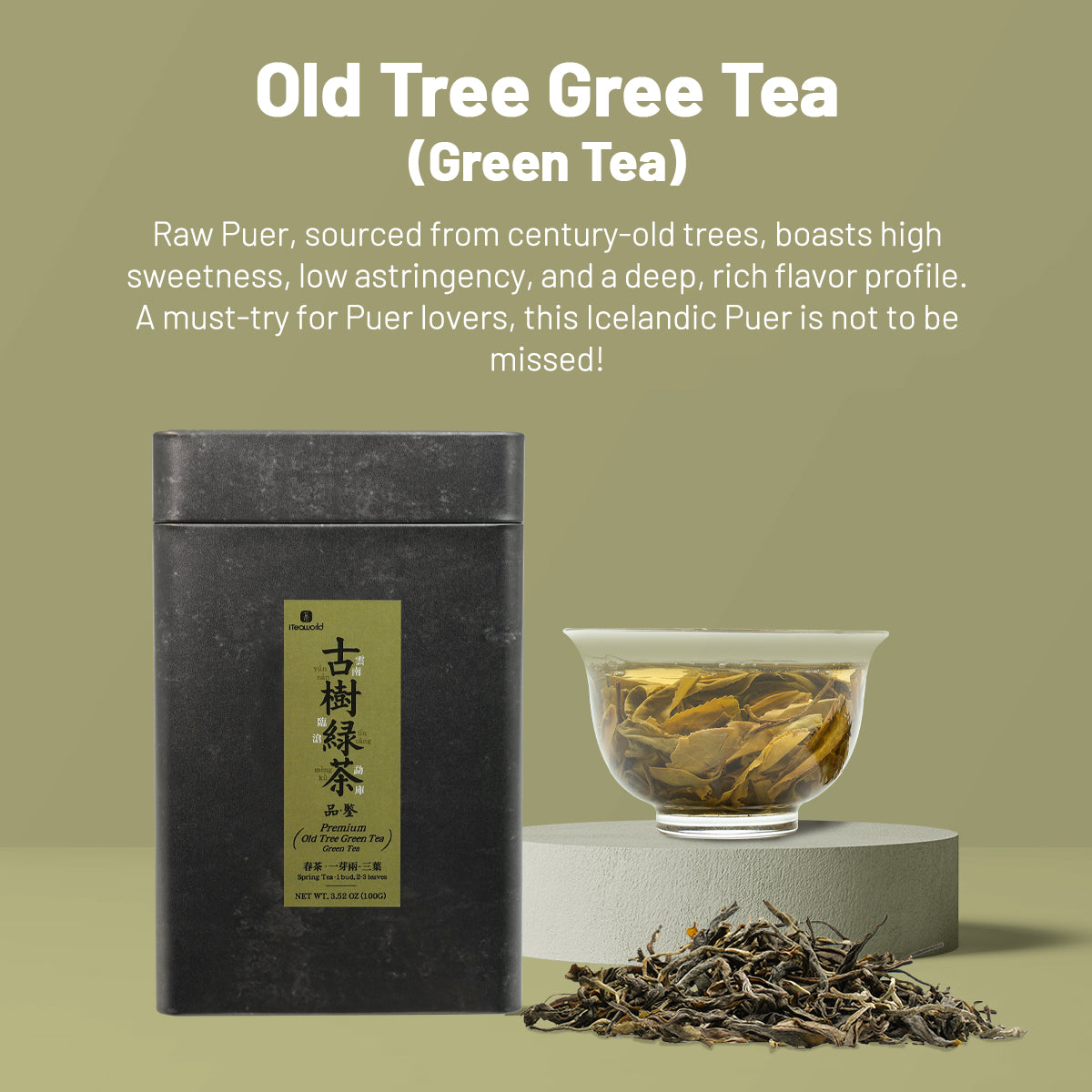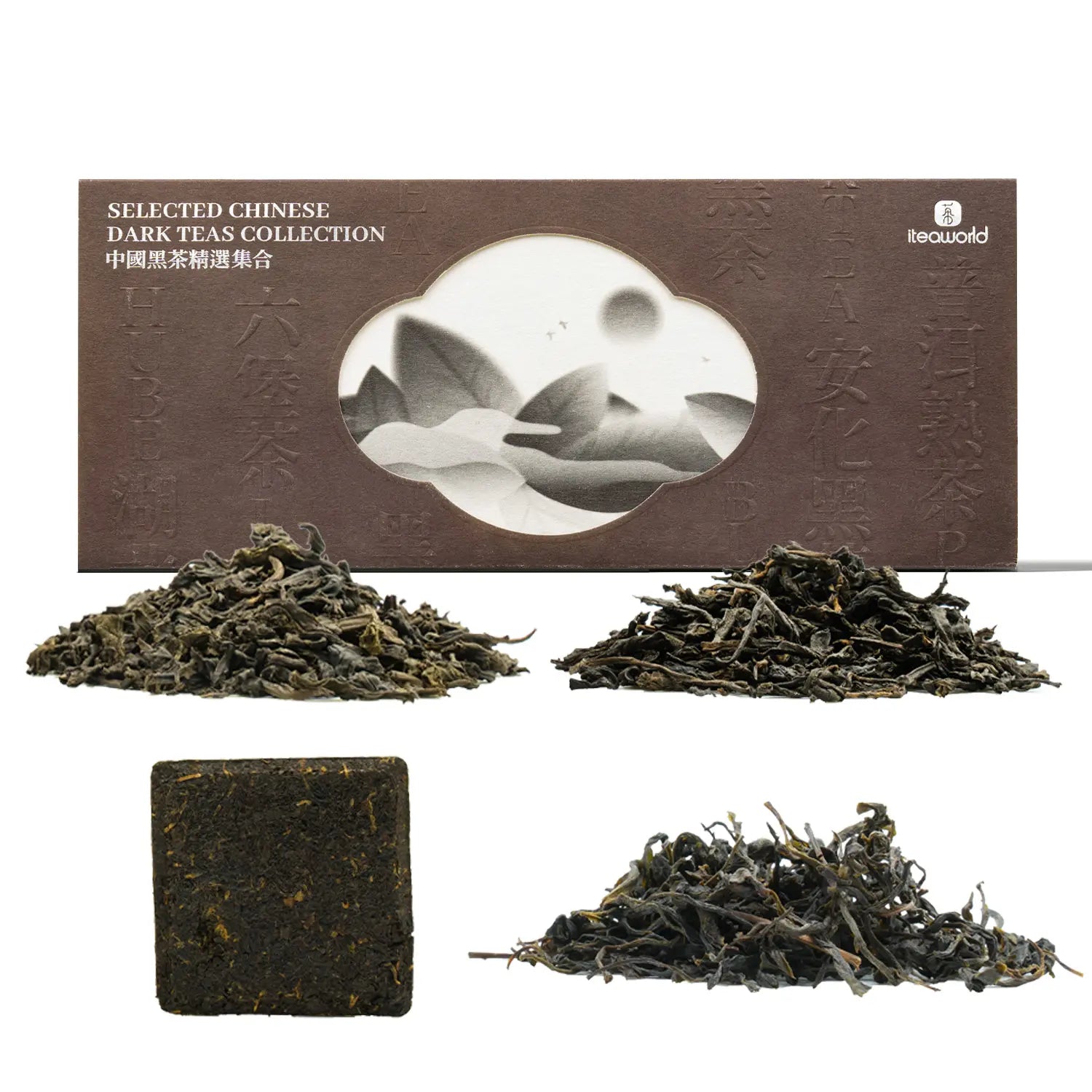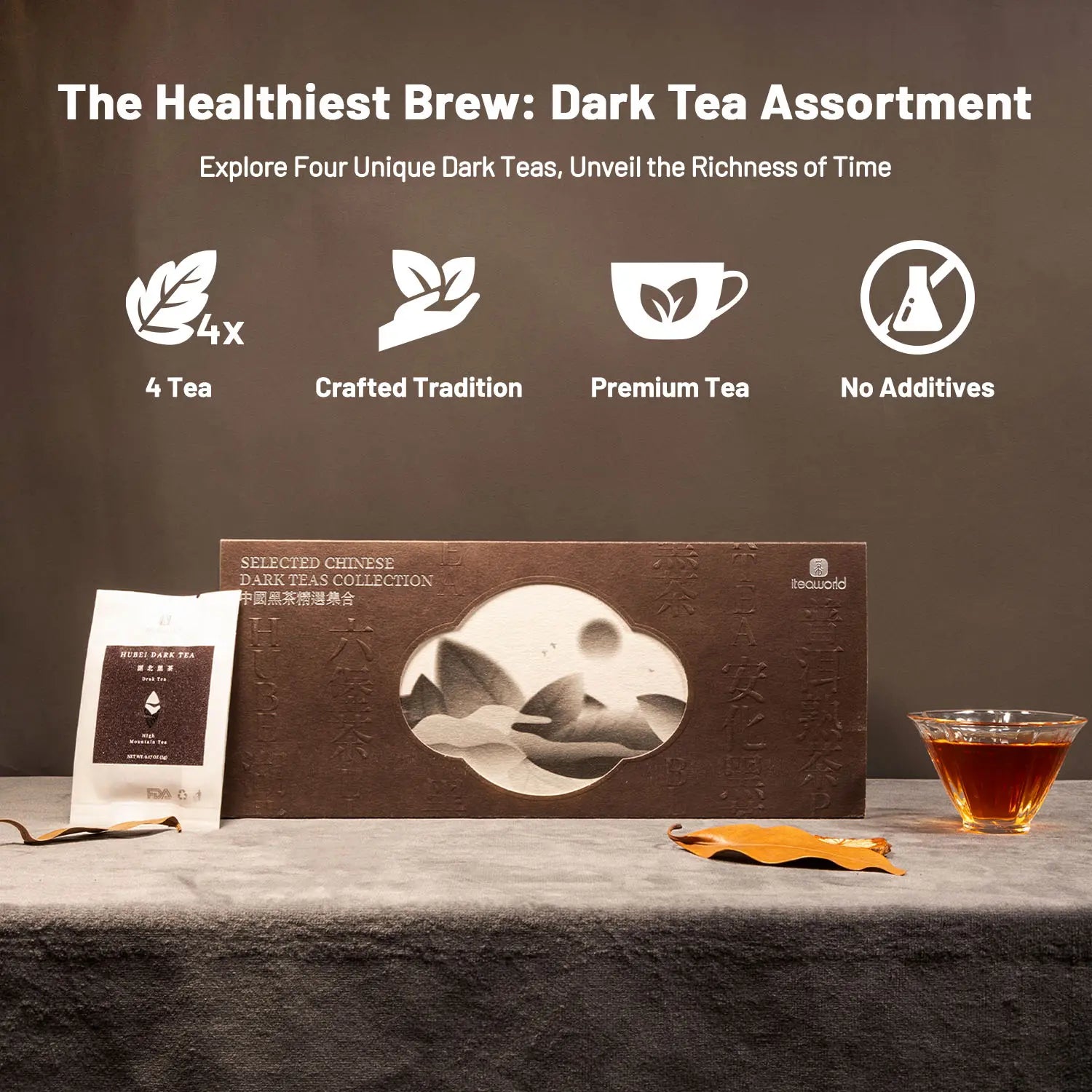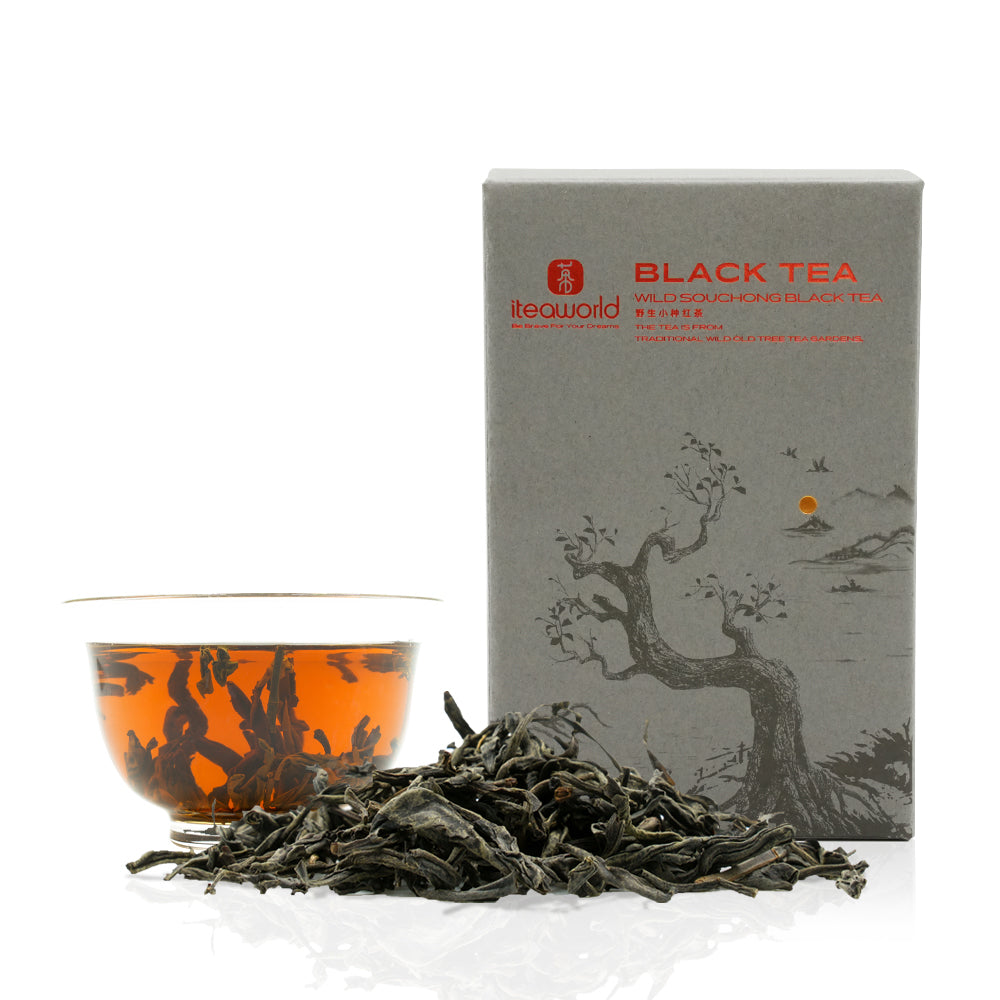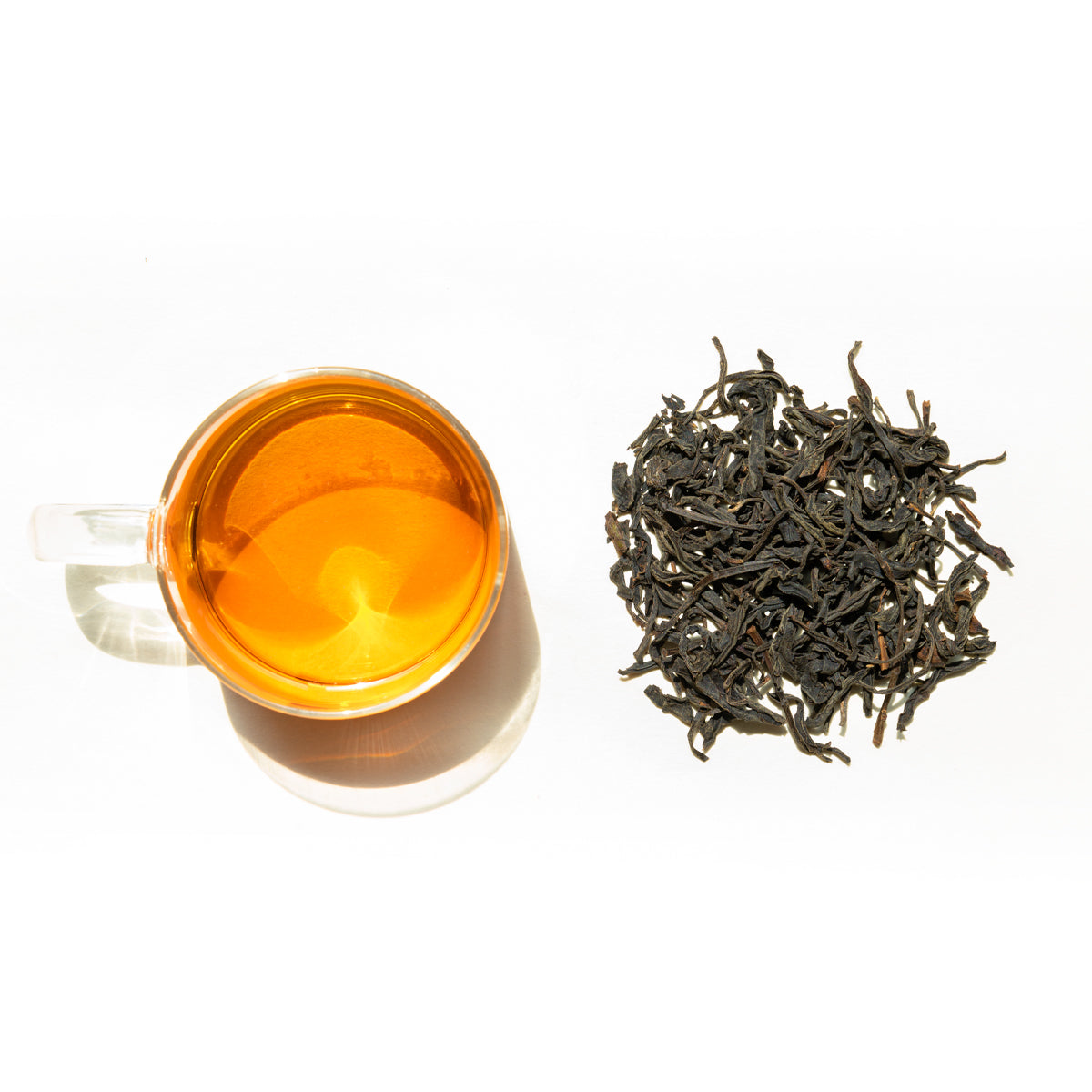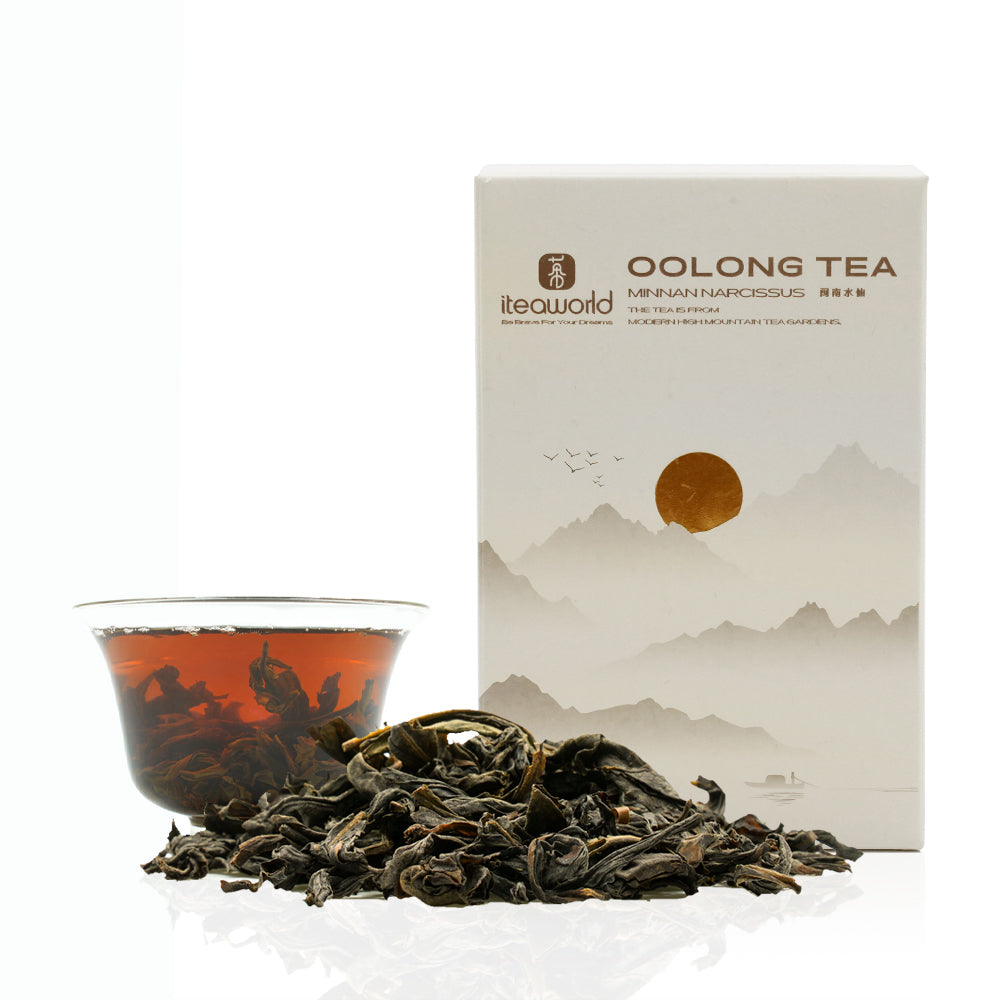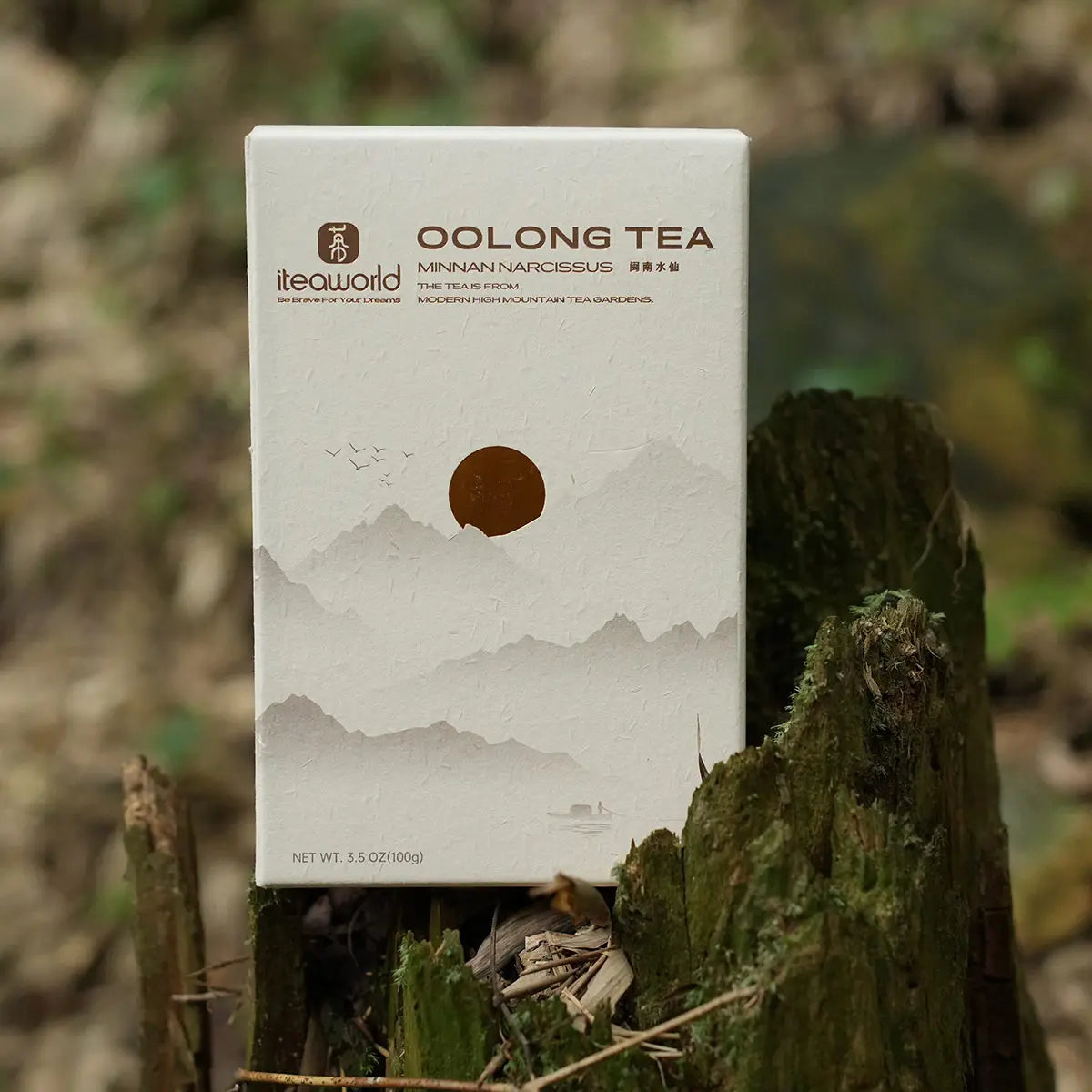23 products
23 products
Sort by:
Sip Serenity: Six Exceptional Green Teas, Each a Poetic Journey. From Enshi to Huangshan, a tribute to tea farmers. Close your eyes, and feel nature's embrace. Featuring Enshi Jade Dew, Dragonwell, Biluochun, Jasmine Green Tea, Ancient Tree Green Tea, and Huangshan Maofeng. Experience Chinese green tea's essence, a cleansing calm like riverside willows in spring. Embrace serenity, and savor leisure with every cup.
During the aging and transportation process of aged tea, the packaging and the tea itself may get damaged. Please be cautious when purchasing if you mind this.
Recommended Purchase
Bailing Wellness Tea is a unique aged Fu Brick tea that originated from the Silk Road’s traditional tea culture. This tea was crafted in 1988 by Hunan Tea Import & Export Company using premium Fu Brick and Hei Brick tea leaves. After 34 years of careful aging in a dry storage environment, this tea has developed a mellow taste, rich in medicinal fragrance and a smooth, slightly sweet aftertaste. Traditionally, it has been a staple among Northwest China’s ethnic groups, who consume a high-fat diet yet maintain a fit and energetic lifestyle. Bailing Wellness Tea’s unique fermentation process enhances its ability to aid digestion, promote metabolism, and support overall wellness. This product retains its original sealed paper box packaging and is no longer available on the market.
Key Details about Bailing Fitness Tea
- Origin: Hunan Province, China
- Production Date: 1988
- Grade: Third Grade
- Tea Cultivar: Fu Brick, Hei Brick Tea Fragments
- Craftsmanship: Traditional Fu Brick fermentation, natural aging
- Flavor Highlights: Bright yellow liquor, rich aged aroma with herbal notes, mellow and smooth taste, slight medicinal sweetness
- Storage: Dry warehouse storage, original sealed packaging
What is Fu Brick Tea?
Fu Brick Tea is a type of dark tea originating from Hunan, China, known for its unique post-fermentation process and health benefits. It contains Golden Flowers (Eurotium cristatum), a probiotic beneficial for digestion and metabolism. Due to its long aging potential, Fu Brick tea develops a complex and mellow taste over time. Bailing Fitness Tea, aged for 34 years, showcases a rich, medicinal aroma with a silky smooth texture, making it a prized selection among aged tea enthusiasts.
Recommended Brewing Methods
-
Gaiwan Brewing
- Tea-to-water ratio: 1:20
- Water temperature: 95°C-100°C
- Infusions: 6-8 times
- Steeping time: 10~20 seconds
-
Thermos Brewing
- Tea-to-water ratio: 1g per 100ml water
- Water temperature: 100°C (boiling water)
- Steeping time: 1-2 hours
- Tool: Insulated thermos
-
Boiling Method
- Tea-to-water ratio: 1g per 100ml water
- Boiling time: 1-2 minutes, then let sit for 2-3 minutes
- Rebrew: Extend boiling time by 3 minutes for each additional infusion
- Best with: Ceramic or glass teapot
- Steeping times: 3-4 brews
Storage Guidelines
To maintain the tea’s optimal aging process, store it in a dry and cool environment with humidity below 45% and temperature under 25°C. Keep it away from strong odors, direct light, and air exposure. Proper storage ensures that the tea retains its aged aroma and continues to mature gracefully over time.
Weight & Packaging
- Net Weight: 75g
- Packing Type: Original sealed paper box with moisture-proof coating
About Hunan Tea Import & Export Company
Founded in the early 20th century, Hunan Tea Import & Export Company is a pioneering force in China's tea trade. The company played a crucial role in exporting Fu Brick Tea along the Silk Road, making it a staple among ethnic groups in Northwest China and Central Asia. The company’s expertise in traditional tea fermentation and storage has ensured the production of high-quality aged teas that stand the test of time.
Today, this 34-year aged Bailing Fitness Tea remains a remarkable testament to China’s tea heritage and the enduring appeal of Fu Brick Tea.
- Four types of packaging are randomly dispatched.
- During the aging and transportation process of aged tea, the packaging and the tea itself may get damaged. Please be cautious when purchasing if you mind this.
Recommended Purchase
This aged Jasmine Tea is a rare and exquisite tea that has been naturally stored for over 30 years, making it a true collector’s item. Crafted by the renowned Fuqing Dongge Overseas Chinese Tea Factory in the early 1990s, this tea has undergone decades of natural aging, enhancing its depth of flavor and smoothness. Unlike freshly scented jasmine tea, this aged version offers a more mellow and rich taste with a deep, lingering floral fragrance. It has completely transformed over time, developing a soothing and slightly honeyed undertone while retaining its signature jasmine aroma. This tea is no longer in circulation on the market, making it a unique find for tea connoisseurs and collectors.
Key Details about Jasmine Tea
- Origin: Fuqing, Fujian, China
- Production Date: Early 1990s
- Grade: Third Grade
- Tea Cultivar: Green tea buds
- Craftsmanship: Aged naturally over decades, originally scented with jasmine flowers
- Flavor Highlights: Aged floral aroma, mellow and smooth taste, slightly honeyed aftertaste
- Storage: Stored in a dry, cool environment in the northwest warehouse
What is Aged Jasmine Tea?
Aged Jasmine Tea is a unique category of jasmine tea that has been carefully stored for decades, allowing its flavors to develop and mature over time. While fresh jasmine tea is prized for its bright floral notes, aged jasmine tea offers a deeper, smoother taste with a richer texture. The aging process enhances the tea’s complexity, reducing any bitterness and infusing it with subtle honeyed sweetness. This type of tea is rare due to its long storage period and the fact that it is no longer in active production, making it highly sought after by tea collectors and enthusiasts.
Recommended Brewing Methods
-
Gaiwan Brewing
- 100ml Gaiwan
- 95℃-100℃
- 4-6 times
- 1:15 to 1:20
- 15-20 seconds
-
Thermos Brewing
- 1g tea per 100ml (3.4oz) water
- Use water at 95℃
- Steeping Time: 1-2 hours
- Tool: Insulated thermos
Storage Guidelines
Store in a cool, dry place, away from light, moisture, and strong odors. Proper storage will help preserve the delicate fragrance and flavor of the jasmine tea.
Weight & Packaging
- Net Weight: 50g (1.76oz)
- Packing Type: Original paper box sealed packaging
About Fuqing Dongge Overseas Chinese Tea Factory
The Fuqing Dongge Overseas Chinese Tea Factory, established in 1963, is a renowned producer of high-quality teas, specializing in jasmine-scented teas. Located in Fuqing, Fujian, an area rich in tea cultivation, the factory has been dedicated to preserving traditional tea-making methods while ensuring the highest standards of craftsmanship. With decades of experience, Fuqing Dongge has become a trusted name in the tea industry, especially known for its aromatic jasmine tea, which has gained popularity both domestically and internationally. The aged Jasmine Tea from this factory is a testament to their commitment to excellence and the beauty of time-enhanced tea.
Introduction:
This Da Hong Pao tea is carefully selected from the autumn harvest of 2023, plucked from high-altitude tea gardens in Wuyi Mountain, Fujian, at elevations exceeding 400 meters. The exceptional growing conditions impart a rich, robust flavor and complex layers of taste. The plucking standard of one bud and two leaves ensures a full-bodied, sweet aftertaste, with a pronounced fruity aroma and a distinct "rock essence" (Yan Yun).
Reasons to Recommend:
- Rich History: With over 700 years of history, Da Hong Pao is regarded as the premier tea among scholars and literati.
- Core Production Area: Grown in the heart of Wuyi Mountain, Fujian, where the average annual temperature ranges from 16°C to 25°C, the frost-free period lasts 253-272 days, and annual rainfall is around 2000 mm. The acidic red soil, rich in organic matter and minerals, contributes to the unique flavor profile of Da Hong Pao tea trees.
- High-Altitude Tea Gardens: This tea is cultivated in high-altitude gardens in Wuyi Mountain, where the superior climate enhances the tea's richness, delivering a fuller, sweeter aftertaste and a more intense, lingering aroma with a pronounced "rock essence."
- Unique Roasting Process: Premium tea leaves are slowly roasted under gentle heat, developing a sweet fragrance with a subtle smoky undertone.
Oxidation Level: 50%-60%
Roasting Level: Full roast
Tea Garden Soil: Yellow soil
Master Blender: [Name of Master Blender, if available]
Processing Time: Autumn 2023
Best Before Date: 36 months
Tea Variety: Da Hong Pao Blend
During the aging and transportation process of aged tea, the packaging and the tea itself may get damaged. Please be cautious when purchasing if you mind this.
Recommended Purchase
This 2004 Yunnan Qi Zi Bing Tea is a traditional Pu'er tea, crafted from summer-harvested tea leaves of the renowned Ban Zhang organic tea gardens in Yunnan. Known for its deep, rich flavor profile, this tea undergoes moderate fermentation and is steamed and compressed into a round shape. With a bright orange-red liquor and a distinct camphor aroma, this tea has a full-bodied, smooth taste with a lingering sweetness. As the tea ages, the bitter and astringent notes fade, leaving a refreshing, cooling aftertaste that is ideal for digestion and rejuvenation. This tea is perfect for those who appreciate the bold characteristics of Puerh tea and the specific flavor of Ban Zhang.This product remains in its original packaging and is no longer available on the market.
Key Details about Yunnan Qi Zi Bing Tea
- Origin: Yunnan, China
- Production Date: 2004
- Grade: Second Grade
- Tea Cultivar: Yunnan Large Leaf
- Craftsmanship: Moderately fermented, then steamed and compressed into round cakes.
- Flavor Highlights: Camphor aroma, strong yet quickly fading bitterness, clear orange-red liquor with a lingering sweetness
- Storage: Naturally stored in Dongguan with slight humidity, no off-flavors
What is Yunnan Qi Zi Bing Tea?
Yunnan Qi Zi Bing Tea, also known as "round tea," is a special type of compressed Puerh tea, made with high-quality leaves from the famous Ban Zhang tea gardens in Yunnan. Known for its strong, full-bodied flavor, the tea undergoes careful fermentation and steaming before being compressed into round cakes, which allows the flavors to develop over time. Its smooth, slightly bitter taste transforms with aging, revealing a rich, mellow character. As it continues to age, this tea becomes increasingly smooth and balanced, with a noticeable cooling and refreshing aftertaste.
Recommended Brewing Methods
-
Gaiwan Brewing
- 100ml Gaiwan
- 95℃-100℃
- 5-7 times
- 1:15 to 1:25 |
- 10~20 seconds
-
Thermos Brewing
- 1g tea per 100ml (3.4oz) water
- Use boiling water (212°F)
- Steeping Time: 1-2 hours
- Tool: Insulated thermos
-
Boiling Method
- Add 1g tea per 100ml (3.4oz) water
- Boil for 1-2 minutes, then let sit for 2-3 minutes
- For each additional brew, extend boiling time by 3 minutes.
- A ceramic or glass teapot is recommended for the best taste.
- Enjoy up to 3-4 brews
Storage Guidelines
Store this tea in a well-ventilated, dry environment with a humidity level below 45% and temperature below 25°C (77°F). Keep it away from strong odors, light, and air exposure. Proper storage ensures the tea retains its flavor and continues to age gracefully over time.
Weight & Packaging
Net Weight: 357g (12.6oz)
Packing Type: Paper-wrapped
About the Source of the Tea
This Yunnan Qi Zi Bing Tea is sourced from the high-quality Ban Zhang tea gardens, which are renowned for producing some of the finest Puerh teas. Located in the southern part of Yunnan, the Ban Zhang region has a long history of tea cultivation, and its leaves are prized for their robust flavor and ability to age well over time. The tea is carefully produced by the Yunnan Tea Import and Export Company, which is known for its commitment to high standards in tea production.
Our Six-Tea Collection invites you to explore the rich traditions of China’s six major tea types, each represented by a world-famous classic: Biluochun (Green Tea), Junshan Yinzhen (Yellow Tea), Bai Mudan (White Tea), Fenghuang Dancong (Oolong Tea), Shu Puer (Dark Tea), and Dianhong (Black Tea). Each tea is carefully sourced from its original growing region, handcrafted by tea masters with over 20 years of experience, and graded premium or higher to ensure outstanding quality.
From the floral freshness of Biluochun to the natural sweetness of Bai Mudan, the aromatic complexity of Fenghuang Dancong, and the smooth, earthy richness of Shu Puer, this collection showcases the diverse flavors and traditions of Chinese tea. Whether you’re a tea enthusiast or just curious about tea culture, this set offers an unforgettable tasting experience and makes a thoughtful gift steeped in history and craftsmanship.
What's Inside?
-
Biluochun (Green Tea)
- Origin: Suzhou, Jiangsu
- Grade: High-grade, one bud and one leaf
- Renowned for its tender, spiraling leaves and refreshing, floral aroma, Biluochun is a green tea lover’s favorite. Handpicked from lush gardens, it embodies the spring’s vitality.
-
Junshan Yinzhen (Yellow Tea)
- Origin: Dongting Lake, Hunan
- Grade: Top-quality, golden buds
- Rare and precious, this yellow tea dazzles with its unique honeyed aroma and silky smooth flavor. It's a sophisticated treasure for discerning palates.
-
Bai Mudan (White Tea)
- Origin: Fuding, Fujian
- Grade: Superior, one bud and one leaf
- With delicate floral and fruity notes, Bai Mudan offers a mellow yet rich flavor, showcasing the elegance of minimally processed white tea.
-
Fenghuang Dancong (Oolong Tea)
- Origin: Chaozhou, Guangdong
- Grade: Premium-grade from Phoenix Mountain
- Known as “Phoenix Single Bush,” this oolong captivates with its naturally sweet, fruity, and aromatic complexity. A true connoisseur’s delight.
-
Shu Puer (Dark Tea)
- Origin: Yunnan
- Grade: Aged and expertly fermented
- With earthy, rich notes, Shu Puer offers a grounding and soothing tea experience. Perfect for those who enjoy deep, bold flavors.
-
Dianhong (Black Tea)
- Origin: Fengqing, Yunnan
- Grade: Made by a historic tea factory with over 70 years of expertise
- Bold and robust, Dianhong showcases a natural sweetness and malty depth. Its golden tips reflect its premium quality and craftsmanship.
Introduction:
This Tieguanyin tea is meticulously selected from the finest spring harvest of 2024. Sourced from high-altitude tea gardens in Anxi, Fujian (the most authentic origin), at an elevation of approximately 600 meters, the superior climatic conditions impart a mellow flavor and rich, layered complexity to the tea. The plucking standard of one bud and two leaves ensures a smooth, buttery texture, reminiscent of sipping on a cup of radiant spring blossoms, with orchid-like floral notes and a refreshing, crisp aroma.
Reasons to Recommend:
- A Renowned Chinese Tea: Anxi Tieguanyin, originating around 1725, is one of China's top ten famous teas. On May 22, 2023, Anxi Tieguanyin was awarded the "Globally Important Agricultural Heritage Systems" certificate.
- Authentic Origin: Grown in Anxi, Fujian, where the mountainous terrain and misty climate create an average annual temperature of 15-18°C, a frost-free period of 260-324 days, and annual rainfall of 1700-1900mm. The relative humidity exceeds 78%. The acidic red soil, rich in organic matter and minerals, contributes to the unique flavor profile of Tieguanyin tea trees.
- High-Altitude Tea Gardens: Compared to other Tieguanyin teas, this one is cultivated in high-altitude gardens in Anxi, where the exceptional climate enhances the tea's richness, delivering a smoother, sweeter aftertaste and a more intense aroma.
Oxidation Level: 10%-20%
Roasting Level: Light roast
Tea Garden Soil: Red soil
Processing Time: Spring 2024
Best Before Date: 24 months
Tea Variety: Tieguanyin
Introduction:
This Fenghuang Dancong tea is meticulously selected from the autumn harvest of 2023. Plucked from ancient tea trees in high-altitude gardens in Fenghuang Town, Guangdong, at elevations of approximately 850 meters, the exceptional growing conditions impart a refined texture and rich, layered flavors. The plucking standard of one bud and two leaves ensures a smooth, full-bodied taste, combining fruity notes with a roasted aroma that lingers delightfully.
Reasons to Recommend:
- Core Production Area: Grown in Fenghuang Town, Chaozhou, Guangdong, where the mild climate features an average annual temperature of 21.4°C and annual rainfall of 1685.9 mm. The acidic red soil, deep and rich in organic matter and trace elements, plays a crucial role in shaping the tea's distinctive aroma and flavor.
- Tea for Diplomatic Occasions: On April 7, 2023, French President Emmanuel Macron visited Guangzhou and was served Fenghuang Dancong tea during a tea ceremony at the Songyuan Hotel, highlighting its status as a prestigious Guangdong tea.
- Unique Tea Variety: Harvested from ancient tea trees over 100 years old, planted 6-8 meters apart in remote mountainous areas and picked only once a year. This ensures a rich, sweet aftertaste with a slight astringency, characteristic of Fenghuang Dancong.
- Special Processing Techniques: The unique methods of oxidation and medium roasting create a tea with floral and honey-like aromas, setting it apart from others.
Oxidation Level: 30%-40%
Roasting Level: Medium roast
Tea Garden Soil: Yellow soil
Processing Time: Autumn 2024
Best Before Date: 24 months
Tea Variety: Fenghuang Dancong
Introduction:
This Yunnan black tea is carefully selected from the spring harvest of 2024. Plucked from high-altitude tea gardens in Fengqing County, Yunnan, at elevations of approximately 1600 meters, the exceptional growing conditions impart a rich, robust flavor and complex layers of taste. The plucking standard of one bud and two leaves ensures a smooth, full-bodied texture, with notes of caramel, malt, and honey.
Reasons to Recommend:
- Core Production Area: Grown in Fengshan Town, Fengqing County, Yunnan, where the average annual temperature ranges from 18°C to 22°C, with significant daily temperature variations. The annual precipitation is 1200-1700 mm, characterized by a climate where "morning and evening mists blanket the land on clear days, and clouds shroud the mountains on rainy days."
- A National Gift: In 1986, Queen Elizabeth II was presented with Yunnan black tea as a national gift during her visit to China.
- Unique Tea Variety: Sourced from the large-leaf tea trees of Yunnan, known for their rich, enduring flavor and high tolerance for multiple infusions. The large-leaf variety has a longer growth cycle (2-3 years), with large, pointed leaves that contain higher levels of water extract and other compounds.
- High-Mountain Tea Gardens: Since ancient times, high mountains shrouded in mist have produced premium teas. This tea thrives in such environments, where lush vegetation and organic-rich soil, combined with extreme daily temperature fluctuations, enhance the accumulation of flavorful compounds in the leaves.
Oxidation Level: Fully oxidized
Roasting Level: None
Tea Garden Soil: Yellow soil
Processing Time: Spring 2024
Best Before Date: 24 months
Tea Variety: Yunnan Big Leaf
Wild Souchong Black Tea uses wild tea leaves from mountains in Guangxi Province. It uses a special tea-making method of traditional Lapsang Souchong technique. Wild Souchong Black Tea maintains the taste of Lapsang Souchong, while it has a richer flavor. Lapsang Souchong is the earliest black tea and it is called black tea originator. It has a history of 400 years. Lapsang Souchong is baked by pine needles or pine wood. As a result, it has very strong fragrance. Also, due to the bake technique, the color of the tea is grey black and the color of tea soup is dark amber.
Introduction:
This Guangxi black tea is carefully selected from the autumn harvest of 2023. Plucked from ancient tea trees in high-altitude gardens in Longsheng Town, Guangxi, at elevations of approximately 800 meters, the exceptional growing conditions impart a rich, robust flavor and complex layers of taste. The plucking standard of primarily one bud and two leaves ensures a smooth, sweet taste with a delightful aroma, satisfying the palates of black tea enthusiasts.
Reasons to Recommend:
- High-Mountain Tea Gardens: Sourced from the mountainous regions of Guangxi, at an elevation of 800 meters near Guilin. High mountains are known for producing premium teas. These tea trees, grown for many years, have deep roots and lush leaves, absorbing abundant nutrients and minerals.
- Century-Old Tea Trees: Harvested from ancient tea trees over 100 years old, located in remote mountainous areas. These sexually propagated century-old trees, each covering an area of 6-8 square meters, are picked only once a year, resulting in a sweet, enduring flavor with low astringency.
- Organic Management: No chemical fertilizers, pesticides, or growth promoters are used. The tea garden is managed through organic practices, preserving ecological balance and enhancing the tea's quality, taste, and aroma.
Oxidation Level: Medium oxidation
Roasting Level: Medium roast
Tea Garden Soil: Red soil
Processing Time: Autumn 2023
Best Before Date: 36 months
Tea Variety: Fenghuang Dancong
Introduction:
This Yingde black tea is meticulously selected from the spring harvest of 2023. Plucked from high-altitude tea gardens in Yinghong Town, Guangdong, at elevations of approximately 200 meters, the exceptional growing conditions impart a smooth texture and rich, layered flavors. The plucking standard of primarily one bud and two leaves ensures a full-bodied, velvety taste, with notes of caramel and cocoa, satisfying the palates of black tea enthusiasts.
Reasons to Recommend:
- A Renowned Chinese Tea: Recognized as a world-class high-aroma black tea, Yingde black tea was awarded the title of the world's finest high-aroma black tea by the International Tea Committee in 2019.
- Core Production Area: Grown in Yingde City, Guangdong, where the average annual temperature is 20.7°C, annual rainfall is 1876.8 mm, average relative humidity is 79%, and the frost-free period lasts 316.7 days. The fertile acidic red soil, rich in organic matter and nitrogen, contributes to the tea's exceptional quality.
- Tea for Diplomatic Occasions: On April 7, 2023, French President Emmanuel Macron visited Guangzhou and was served Yingde black tea during a tea ceremony at the Songyuan Hotel, highlighting its status as a prestigious Guangdong tea.
- Unique Aroma: Yingde black tea is crafted from the fresh leaves of Yunnan large-leaf tea trees and Fenghuang Shuixian tea trees (known for their high aroma). This combination results in a robust flavor and intense fragrance.
Oxidation Level: High
Roasting Level: None
Tea Garden Soil: Lateritic red soil
Processing Time: Spring 2023
Best Before Date: 24 months
Tea Variety: Yinghong No. 9




